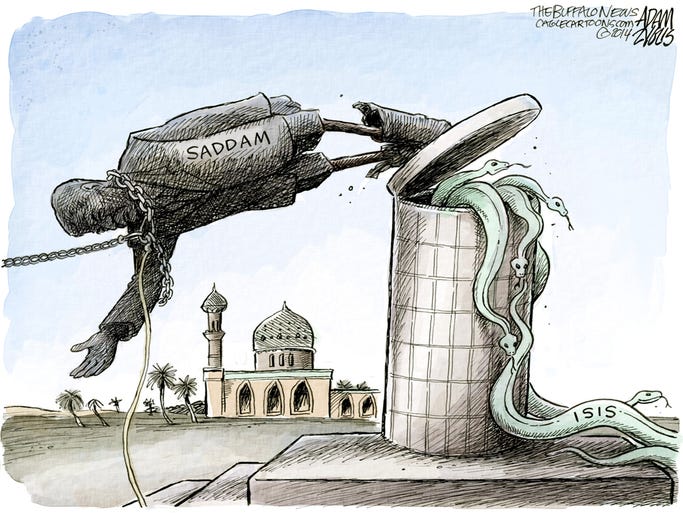Saddam Hussein - If we could keep the whole of the Shatt al Arab – our strategic goal in our war with Iran – we will make concessions (to the Kuwaitis). But, if we are forced to choose between keeping half of the Shatt and the whole of Iraq (i.e., in Saddam s view, including Kuwait ) then we will give up all of the Shatt to defend our claims on Kuwait to keep the whole of Iraq in the shape we wish it to be. (pause) What is the United States’ opinion on this?
U.S. Ambassador Glaspie – We have no opinion on your Arab – Arab conflicts, such as your dispute with Kuwait. Secretary (of State James) Baker has directed me to emphasize the instruction, first given to Iraq in the 1960′s, that the Kuwait issue is not associated with America. (Saddam smiles)
On August 2, 1990, Saddam massed troops to invade and occupy Kuwait. _____
Baghdad, September 2, 1990, U.S. Embassy
One month later, British journalists obtain the the above tape and transcript of the Saddam – Glaspie meeting of July 29, 1990. Astounded, they confront Ms. Glaspie as she leaves the U.S. Embassy in Baghdad.
Journalist 1 – Are the transcripts (holding them up) correct, Madam Ambassador?(Ambassador Glaspie does not respond)
Journalist 2 – You knew Saddam was going to invade (Kuwait ) but you didn’t warn him not to. You didn’t tell him America would defend Kuwait. You told him the opposite – that America was not associated with Kuwait.
Journalist 1 – You encouraged this aggression – his invasion. What were you thinking?
U.S. Ambassador Glaspie – Obviously, I didn’t think, and nobody else did, that the Iraqis were going to take all of Kuwait.
Journalist 1 – You thought he was just going to take some of it? But, how could you? Saddam told you that, if negotiations failed , he would give up his Iran (Shatt al Arab waterway) goal for the Whole of Iraq, in the shape we wish it to be. You know that includes Kuwait, which the Iraqis have always viewed as an historic part of their country!
Journalist 1 – American green-lighted the invasion. At a minimum, you admit signaling Saddam that some aggression was okay – that the U.S. would not oppose a grab of the al-Rumeilah oil field, the disputed border strip and the Gulf Islands (including Bubiyan) – the territories claimed by Iraq?
(Ambassador Glaspie says nothing as a limousine door closed behind her and the car drives off.)
http://www.globalresearch.ca/gulf-war-documents-meeting-between-saddam-hussein-and-ambassador-to-iraq-april-glaspie/31145
By the summer of 1983 Iran had been reporting Iraqi use of using chemical weapons for some time. The Geneva protocol requires that the international community respond to chemical warfare, but a diplomatically isolated Iran received only a muted response to its complaints [Note 1]. It intensified its accusations in October 1983, however, and in November asked for a United Nations Security Council investigation.
The U.S., which followed developments in the Iran-Iraq war with extraordinary intensity, had intelligence confirming Iran's accusations, and describing Iraq's "almost daily" use of chemical weapons, concurrent with its policy review and decision to support Iraq in the war [Document 24]. The intelligence indicated that Iraq used chemical weapons against Iranian forces, and, according to a November 1983 memo, against "Kurdish insurgents" as well [Document 25].
What was the Reagan administration's response? A State Department account indicates that the administration had decided to limit its "efforts against the Iraqi CW program to close monitoring because of our strict neutrality in the Gulf war, the sensitivity of sources, and the low probability of achieving desired results." But the department noted in late November 1983 that "with the essential assistance of foreign firms, Iraq ha[d] become able to deploy and use CW and probably has built up large reserves of CW for further use. Given its desperation to end the war, Iraq may again use lethal or incapacitating CW, particularly if Iran threatens to break through Iraqi lines in a large-scale attack" [Document 25]. The State Department argued that the U.S. needed to respond in some way to maintain the credibility of its official opposition to chemical warfare, and recommended that the National Security Council discuss the issue.
Following further high-level policy review, Ronald Reagan issued National Security Decision Directive (NSDD) 114, dated November 26, 1983, concerned specifically with U.S. policy toward the Iran-Iraq war. The directive reflects the administration's priorities: it calls for heightened regional military cooperation to defend oil facilities, and measures to improve U.S. military capabilities in the Persian Gulf, and directs the secretaries of state and defense and the chairman of the Joint Chiefs of Staff to take appropriate measures to respond to tensions in the area. It states, "Because of the real and psychological impact of a curtailment in the flow of oil from the Persian Gulf on the international economic system, we must assure our readiness to deal promptly with actions aimed at disrupting that traffic." It does not mention chemical weapons [Document 26].
http://www2.gwu.edu/~nsarchiv/NSAEBB/NSAEBB82/
When one tries to divorce Iraq from Suddan's attempt to overthrow another country & use weapons fo mass destruction against his own people, which is why we were there to begin with, then you have historical revisionism. And it is dishonest at its core.
Not above engaging in a little "historical revisionism" yourself eh Rev? What did you call that type of behavior again? Dishonest?



